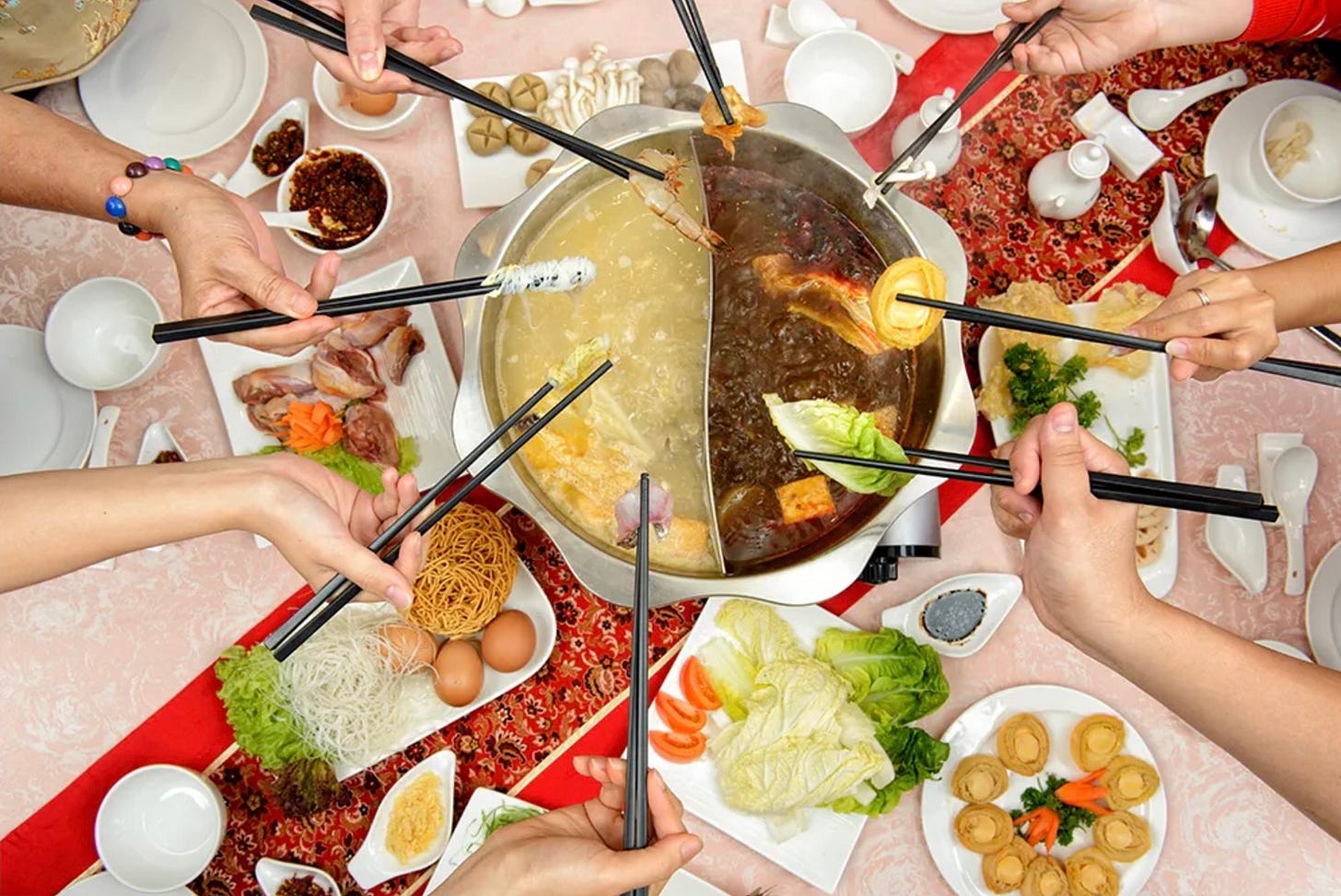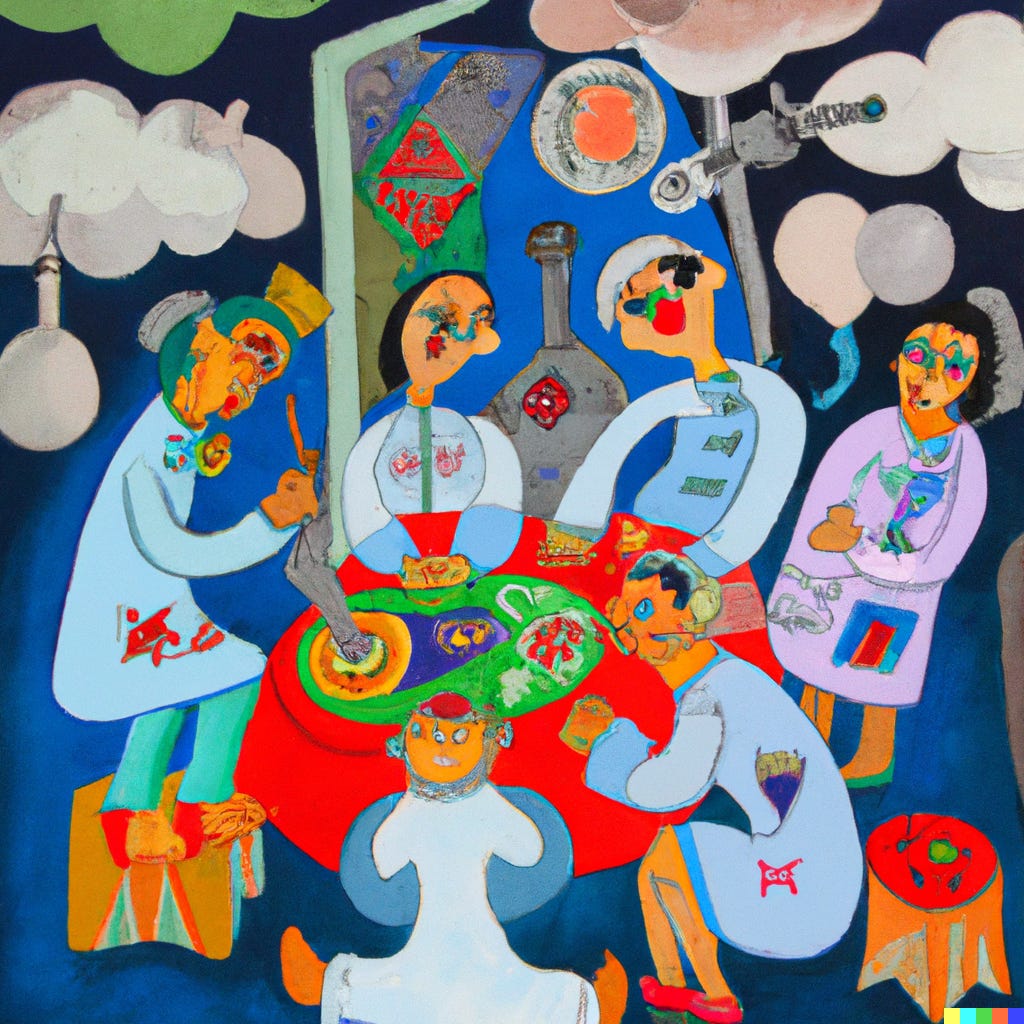How Can You Control It When It's Already in the Hot Pot
Conversations with Tyler Phan, Part Two
Part One is here. My friend Tyler Phan Ph.D is an acupuncturist, anthropologist, and all around smart person who’s fun to talk with about controversial topics — like whether acupuncture is really a profession. (Read more about Tyler’s work and his ethnography of American Chinese Medicine here.)
Me: A lot of people don’t realize that what we know as the acupuncture profession in the US only became a thing in 1982. So it’s recent and raw and messy in ways that aren’t necessarily obvious. But professionalization itself is relatively new, historically speaking, right?
Tyler: Since the latter part of the 19th century. Professionalization is all about structures of legitimacy and power. According to Foucault, back when society was organized under a single sovereign power (for example, the divine right of kings) there were trades organized into guilds. Those guilds got their legitimacy from the sovereign or the despot. The university system actually evolved out of the guilds. As democratic systems come into being, though, the sovereign power diffuses and you see a rise of state and corporate power along with industrialization. As the sovereign power diffuses into state and corporate power, the guilds diffuse into professions. States have authorization over professions and corporations and universities are involved in their legitimization.
When you look at the profession of medicine in the US, an important part of what legitimizes it is its own hierarchy, with physicians at the top. Allopathic biomedicine is very hierarchical. And the acupuncture profession is trying to fit itself into that hierarchy, but acupuncture by nature isn’t hierarchical at all, so it doesn’t really work.
Me: The last time we talked about this, you said something like: The practice of acupuncture will always have variations, especially at the individual level — with any given practitioner, the way they practice basically comes down to “Yo, I just like doing it this way.” Having met a lot of acupuncturists, that struck me as really funny and really true. Everybody has their own rationalizations — my teacher said this, my teacher did that — but at the end of the day it’s about, “Yo, I just like doing it this way.” And as you said, there’s nothing you can do to change that, it always happens. Acupuncturists typically get more idiosyncratic over time; the longer they practice, the quirkier they get.
Tyler: Everybody does acupuncture the way they feel like doing it. There’s no supreme leader of acupuncture. And patients have a similar attitude, they like who they like and it doesn’t track with degrees or certifications or even experience. I’ve met some practitioners who I honestly thought were terrible and they all had patients who loved them and their work.
Me: For sure. And it seems like that phenomenon is not just about human nature, it’s about the squishiness of acupuncture itself, the way it oozes out of any enclosure you try to put it in.
Tyler: Here’s the big question: where does Chinese medicine begin and where does it end? I’ll give you an example. I like to go to KPot Korean Barbecue and Hot Pot. And they have a soup base that’s called “Healthy Herbs”. Not “healthy spices”, mind you, healthy herbs. And it’s got goji berries and astragalus in it! That’s Chinese herbal medicine!
Me: Acupuncturists are constantly arguing about how Chinese herbs are inherently part of the practice of acupuncture and they can’t be separated. I just listened to another round of that last week, in the context of a high level discussion about who should control the practice of acupuncture and Chinese medicine in the US.
Tyler: HOW CAN YOU CONTROL IT WHEN IT’S ALREADY IN THE HOT POT
Me: See, this is why I like talking to you.
Can you say more about the heterogeneity of acupuncture and why it’s a problem in relationship to professionalization?
Tyler: Acupuncture is a diaspora practice that’s constantly changing. It will always be OTHER. It has its own perceptions of reality and cosmology; it’s built on a mapping of subtle bodies. Allopathic biomedical physicians are never going to see acupuncture as a medicine in its own right, they’re never going to, like, diagnose Liver Qi Stagnation in a patient. I mean, come on. Biomedicine has its own epistemology and they don’t intersect. Really the only place biomedicine and acupuncture intersect as systems is in insurance billing. Insurance is the focal point of medicine in the US.
Me: Yes. God help us.
Tyler: The hierarchies of allopathic biomedicine are what sustain it in this culture. But acupuncture isn’t sustained by hierarchies.
Me: I mean, it seems like what’s happening is the opposite. Pardon the swearing, but hierarchies are fucking expensive. The hierarchies that the acupuncture profession wants so badly — it can’t actually afford them.
You and I are both small business people and we know that in any small business there’s a period of time where you’re working for less than minimum wage, if you’re the owner. And you hope that time is limited to your start up period, but really there’s no guarantee, there’s a risk that you could hit a rough patch and be back to working for free again. The acupuncture profession likes to act as if none of that risk exists for acupuncturists, but if you look at the research, a whole lot of acupuncturists are working for nothing or close to nothing. So there’s a lot of lamenting about why acupuncturists don’t join state and professional associations in order to support the profession, but from their perspective, the profession isn’t supporting them on the most basic level.
When you’re an entrepreneur there’s often no choice but to act as if, to basically will yourself into having the business you want. From a certain perspective, that’s what the acupuncture profession did back in 1982, they acted as if all the social machinery were on their side, and they could just slot this new profession into society at the physician level. So on some level I admire their confidence, right? But the economic foundation for physician status didn’t materialize just because they wanted it to; not enough people were actually receiving acupuncture, and they’re still not.
When you’re a small business person you also have to be able to calibrate and adjust and admit — quickly — when an idea you had is just not working out. Even if it was your favorite idea.
Tyler: And if professionalization is your favorite idea, the problem is that it’s like a box with hard sides, it’s not flexible, it’s inorganic and unable to expand. While acupuncture is the opposite of all that.
Me: I feel like this conversation is kind of like being in therapy, when you realize you’re operating out of a belief system unconsciously and you have to make it conscious, so that you can stop creating the same problems for yourself over and over. We have to be conscious that professionalization was a choice that we made about how to approach acupuncture in the US. And maybe it was a mistake.
Professionalization isn’t the result of a natural law like gravity, it isn’t something God dropped on our heads, it’s a relatively recent human construct. Acupuncture is older than professionalization.
Tyler: Acupuncture is fluid, elastic, malleable. It’s always adaptable and always adapting. It’s basically anarchic.
Me: Which is why we love it. Speaking of anarchic things, this conversation makes me think of Ursula K. Le Guin and her quote:
Tyler: If I had to sum up the whole problem with professionalization and acupuncture, I’d do it with that one question: where does Chinese medicine begin and where does it end?
Me: How do you professionalize something when you can’t find the edges?
Tyler: When it’s already in the hot pot.




